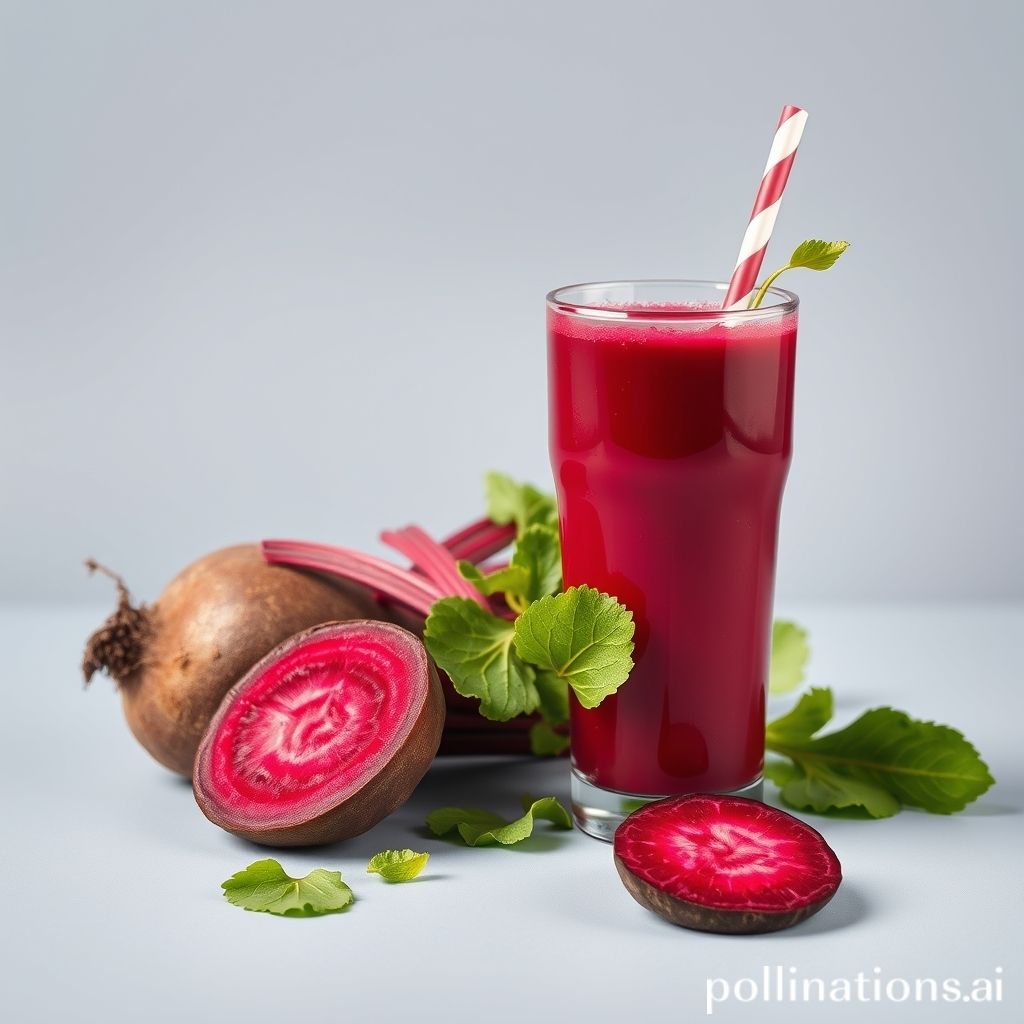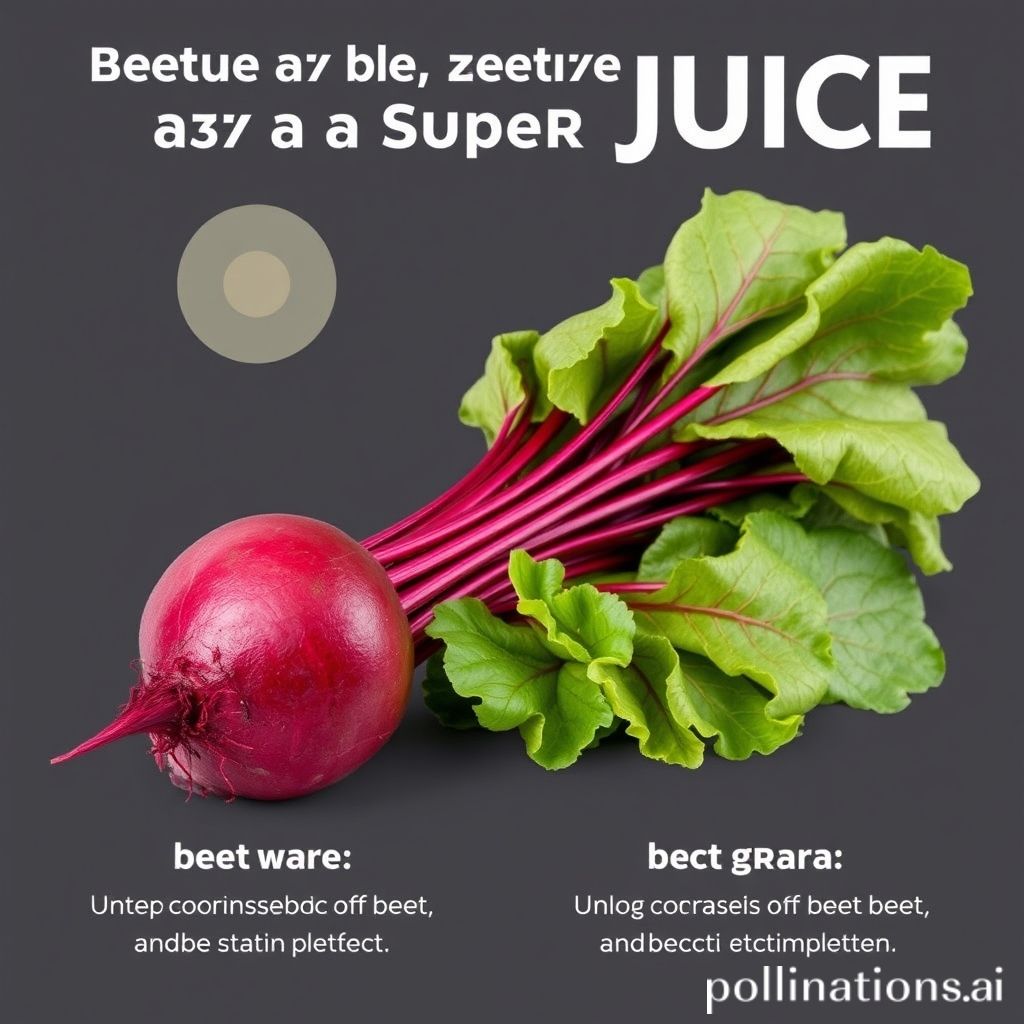Is Beet Juice A Superfood?
“Is beet juice a superfood?” is a common question among health enthusiasts seeking to uncover the truth behind its potential health benefits. Much like the ongoing debate surrounding other so-called superfoods, the curiosity surrounding beet juice stems from its rumored ability to provide exceptional nutrition and promote overall well-being.
People are eager to understand whether consuming this vibrant juice can truly have a transformative impact on their health or if it is simply another passing trend. By delving into the nutritional content and potential health effects of beet juice, we can unravel the mysteries surrounding its superfood status.

Table of Contents
Nutritional Content of Beet Juice
1. Vitamins and Minerals in Beet Juice
Beet juice is a nutritious addition to your diet as it is rich in vitamins and minerals. It contains important nutrients like vitamin C, vitamin B6, folate, manganese, and potassium.
Vitamin C plays a crucial role in supporting the immune system and promoting healthy skin by stimulating collagen production. Vitamin B6 is important for brain development, red blood cell production, and overall brain function. Folate, also known as vitamin B9, is essential for cell growth and reproduction.
Manganese is a trace mineral that acts as a cofactor for various enzymes involved in metabolism and antioxidant defense. Potassium is an electrolyte that helps maintain fluid balance, regulate blood pressure, and support proper muscle and nerve function.
2. Antioxidants in Beet Juice
Beet juice is packed with antioxidants, which protect the body against damage caused by free radicals. Free radicals are unstable molecules that can contribute to chronic diseases and aging.
One of the key antioxidants found in beet juice is betalain, which gives beets their vibrant red color. Betalains have been studied for their potential anti-inflammatory and antioxidant properties, and they may help reduce the risk of certain chronic conditions like heart disease and cancer.
In addition to betalains, beet juice also contains other antioxidants such as vitamin C and flavonoids. These antioxidants work together to neutralize free radicals and promote overall health and well-being.
Expert Tips: Boost your health with nutrient-rich beet juice! Packed with vitamins, minerals, and antioxidants, it supports immunity, brain function, and fights inflammation.Health Benefits of Beet Juice
1. Improved Athletic Performance
Consuming beet juice has been linked to improved athletic performance. Beet juice is rich in nitrates, which are converted into nitric oxide in the body. Nitric oxide helps to relax and widen blood vessels, increasing blood flow and oxygen delivery to the muscles. This can enhance endurance and stamina, allowing athletes to perform at a higher level for a longer period of time.
2. Lower Blood Pressure
Beet juice has been found to have a positive effect on blood pressure. The high levels of nitrates in beet juice help to relax blood vessels, promoting better blood flow and reducing blood pressure. Studies have shown that regular consumption of beet juice can lead to significant reductions in systolic and diastolic blood pressure.
3. Enhanced Digestion
Beet juice contains dietary fiber, which is beneficial for digestion. Fiber adds bulk to the stool, helping to prevent constipation and promote regular bowel movements. Additionally, beet juice has been found to stimulate the production of digestive enzymes, aiding in the breakdown and absorption of nutrients.
Incorporating beet juice into your diet can provide a range of health benefits, including improved athletic performance, lower blood pressure, and enhanced digestion. Whether you are an athlete looking to boost your performance or simply seeking to improve your overall health, adding beet juice to your daily routine may be a beneficial choice.
| Health Benefits of Beet Juice |
|---|
| Improved Athletic Performance: Beet juice is rich in nitrates, which increase blood flow and oxygen delivery to the muscles, enhancing endurance and stamina. |
| Lower Blood Pressure: The high levels of nitrates in beet juice help to relax blood vessels, promoting better blood flow and reducing blood pressure. |
| Enhanced Digestion: Beet juice contains dietary fiber and stimulates the production of digestive enzymes, aiding in digestion and preventing constipation. |
Research on Beet Juice as a Superfood
1. Studies on the Health Benefits
Research on beet juice has uncovered numerous health benefits associated with its consumption:
- Cardiovascular Health: Studies have shown that beet juice can help lower blood pressure, improve blood flow, and enhance cardiovascular health. Its high nitrate content has been linked to improved exercise performance and a reduced risk of heart disease.
- Athletic Performance: Beet juice has become popular among athletes because it has the potential to enhance endurance and performance. Nitrate-rich beet juice can improve oxygen utilization, delay fatigue, and increase exercise capacity.
- Brain Health: The nitrates in beet juice may also have beneficial effects on brain health. Research suggests that consuming beet juice may improve cognitive function, enhance neuroplasticity, and potentially reduce the risk of neurodegenerative diseases.
- Anti-inflammatory Properties: Beet juice contains antioxidants and anti-inflammatory compounds that can help reduce inflammation in the body. This can have positive effects on various conditions, including chronic inflammation and associated diseases.
2. Comparison to Other Superfoods
When comparing beet juice to other superfoods, it is important to consider its unique nutritional profile:
- Antioxidant Content: Beet juice is rich in antioxidants, including betalains, which give it its vibrant color. These antioxidants help protect the body against oxidative stress and may have anti-cancer properties.
- Nutrient Density: Beet juice is a good source of essential nutrients such as folate, manganese, potassium, and vitamin C. These nutrients contribute to overall health and well-being.
- Dietary Fiber: During beet juice lacks dietary fiber, which is typically found in whole beets, it still provides important phytonutrients and beneficial compounds.
During beet juice offers various health benefits and a unique nutritional profile, it is important to remember that superfoods should be consumed as part of a balanced diet. Incorporating beet juice into a well-rounded eating plan can contribute to overall health and wellness.

How to Include Beet Juice in Your Diet
1. Fresh Beet Juice Recipes
If you want to incorporate beet juice into your diet, try making some fresh beet juice recipes. Here are a few delicious and nutritious options to consider:
- Beet-Carrot-Apple Juice: Combine equal parts of beets, carrots, and apples to create a vibrant and nutrient-rich juice with a sweet and earthy flavor.
- Beet-Orange Juice: Mix beets with oranges for a tangy twist. The citrusy taste of oranges complements the earthiness of beets and adds a dose of vitamin C to your juice.
- Beet-Ginger Detox Juice: Add a small piece of ginger to your beet juice for a detoxifying and refreshing beverage. The ginger’s cleansing properties pair well with the detoxifying benefits of beets.
2. Adding Beet Juice to Smoothies and Salads
If you prefer incorporating beet juice into your meals instead of drinking it alone, consider adding it to smoothies and salads. Here are some ideas:
- Beet-Berry Smoothie: Blend beet juice with mixed berries, yogurt, and a splash of honey to create a nutritious and colorful smoothie.
- Beet-Quinoa Salad: Mix cooked quinoa, diced beets, cucumber, feta cheese, and a drizzle of olive oil. Use beet juice as a dressing to add vibrancy and wholesomeness to your salad.
- Beet-Hummus Wrap: Spread beet juice-infused hummus on a whole wheat wrap and top it with sliced avocado, cucumber, and your favorite veggies for a tasty and nutritious lunch.
| Important Information |
|---|
| Beet juice is packed with essential nutrients, including vitamins A, C, and K, as well as minerals like potassium, magnesium, and iron. |
| Beet juice has potential health benefits, such as enhancing exercise performance, lowering blood pressure, and supporting liver health. |
| When incorporating beet juice into your diet, it’s best to start with small amounts and gradually increase the intake to avoid digestive discomfort. |
Potential Side Effects of Beet Juice
1. Red Urine
Consuming beet juice can cause the discoloration of urine, known as “beeturia.” This happens because beets contain a pigment called betacyanin. In the course of beeturia is not harmful, it can be alarming for some people.
Beeturia is more common in individuals with iron deficiency, low stomach acid, or a specific genetic trait. If you notice red or pink urine after drinking beet juice, it is advisable to consult your healthcare provider to rule out any underlying conditions.
2. Beeturia
Aside from causing red urine, beeturia can also result in a change in stool color. Some people may notice pink or reddish stools after consuming beet juice. This effect is harmless and usually goes away on its own.
Although, if you experience any other unusual symptoms along with beeturia, such as abdominal pain or diarrhea, it is important to seek medical advice to determine the underlying cause.
3. Interaction with Medications
Beet juice contains compounds that can interact with certain medications, particularly those used to treat erectile dysfunction like sildenafil (Viagra) or tadalafil (Cialis). This is because beet juice is rich in nitrates.
Combining beet juice with these medications may cause a sudden drop in blood pressure, leading to dizziness or fainting. Therefore, if you are taking any medications for erectile dysfunction, it is crucial to consult your healthcare provider before adding beet juice to your diet.
Conclusion
In the course of beet juice is often touted as a superfood, it does possess several qualities that make it a beneficial addition to a healthy diet. Its high levels of nitrates have been linked to improved athletic performance and cardiovascular health.
Additionally, beet juice is a rich source of vitamins, minerals, and antioxidants that support overall well-being. Despite this, it is important to remember that no single food can provide all the nutrients our bodies need. Therefore, incorporating beet juice into a balanced diet alongside other nutritious foods is key to reaping its potential benefits.
Faq about Beet Juice as a Superfood
FAQ 1: Can beet juice help with weight loss?
Yes, beet juice can aid in weight loss. It is low in calories and high in fiber, which helps you feel fuller for longer. Additionally, beet juice contains nitrates that may improve exercise performance and increase fat burning.
FAQ 2: Is beet juice good for detoxing?
Yes, beet juice is beneficial for detoxification. It contains antioxidants and compounds that support liver function, helping to eliminate toxins from the body. The high fiber content in beet juice also aids in digestion and promotes regular bowel movements.
FAQ 3: How much beet juice should I consume daily?
The recommended daily intake of beet juice is around 8 ounces (240 ml) per day. Nonetheless, it is essential to start with smaller amounts and gradually increase your intake to assess your tolerance and avoid any potential digestive discomfort.
FAQ 4: Can beet juice lower cholesterol levels?
Yes, beet juice has been shown to have potential benefits in lowering cholesterol levels. The high fiber and antioxidant content in beet juice may help reduce LDL (bad) cholesterol and increase HDL (good) cholesterol levels.
FAQ 5: Can beet juice be consumed during pregnancy?
Yes, beet juice can be consumed during pregnancy. Nonetheless, it is crucial to consult with your healthcare provider before making any dietary changes. Beet juice is rich in essential nutrients like folate, iron, and vitamin C, which are beneficial during pregnancy.
Read Similar Post:
1. Managing Uric Acid: The Truth About Beetroot and Gout
2. Lower Uric Acid Naturally: The Benefits of Adding Beetroot to Your Diet

